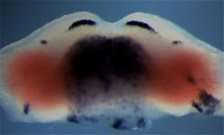Embryo development discovery

(Medical Xpress) -- Researchers have uncovered a novel mechanism they have termed ‘developmental stalling’, that might explain how errors in the development of human embryos are naturally corrected to prevent birth defects.
In a study published in the journal, Proceedings of the National Academy of Sciences (PNAS), researchers from King’s College London’s Dental Institute demonstrate how a key developmental pathway, known as the ‘BMP pathway’ is responsible for ensuring organs correct themselves when growing abnormally in the womb.
Humans are created from a fertilized egg, which develops into an embryo in a process called embryogenesis. The multitude of processes involved in this transition is extremely complex and prone to error. Errors in embryogenesis can lead to birth defects which occur in three to five percent of human births but, given the complexity of embryogenesis, this low figure is in fact surprising.
To explore how potential defects are avoided, the team at King’s looked at different shaped teeth in developing mice embryos. They generated a mutation in a gene called Barx1 that is expressed during the development of molar teeth. However, the loss of Barx1 function did not result in abnormal molars as expected, but rather molar development was ‘stalled’ by 24 hours during embryogenesis.
This stalling was caused by a reduction in the BMP signalling pathway – a pathway that is already well-established as central to the developing embryo. During this stalling period, the BMP activity then steadily rose to eventually reach levels above the normal threshold, and molar development subsequently accelerated to catch up with the rest of the embryo.
The researchers suggest that this organ autonomous stalling of development is a way for the embryo to correct errors in cell signalling that might otherwise lead to abnormal development.
Professor Paul Sharpe from the Department of Craniofacial Development at King’s Dental Institute, said: ‘Developmental stalling may turn out to be a universal mechanism that allows developing tissues and organs to self-correct for any small errors in the complex signalling interactions that drive all developmental processes.
‘"We now want to explore and understand the molecular mechanisms behind this process to enable us to see if this happens in the development of other organs. If we can understand how it works, it will give us vital insight into the development of birth defects in humans."’


















